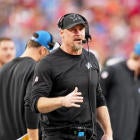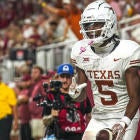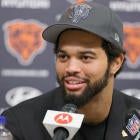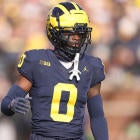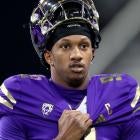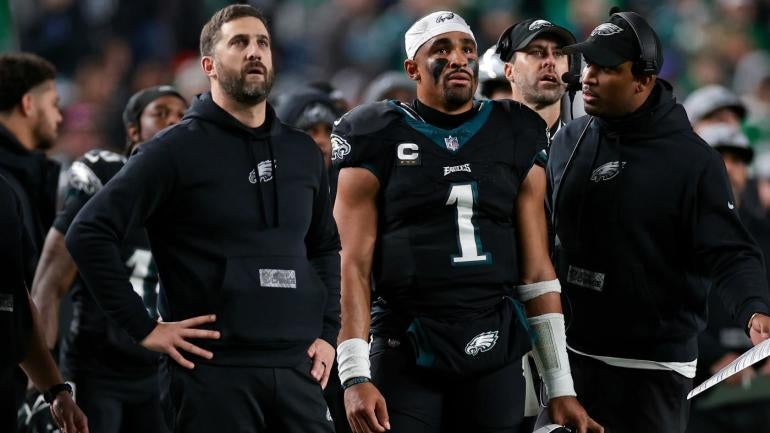
The Eagles are close enough to their last Super Bowl appearance that they can still recall the confetti grazing their helmets and shoulder pads. But the sting of a sour end to the latest season is sharper than ever. And so are the deeper-seated concerns behind the collapse. The young star quarterback has taken a step back. The aging roster is suddenly and sorely in need of replenishing. And, perhaps most of all, the once-revered head coach is without both clear answers and job security.
These are the 2023 Eagles. They are also the 2020 Eagles. Welcome to the cycle of dreams and dysfunction in Philadelphia.
Some may question the magnitude of the current Eagles collapse; this was an 11-6 team, after all, not the 4-11-1 squad that preceded Doug Pederson's exit, or the 4-12 one that sent future Hall of Famer Andy Reid packing back in 2012. As recently as Thanksgiving, Nick Sirianni's Birds looked poised to become the contemporary rendition of the Reid-era team, contending for at least conference titles year in and year out. But to those wondering why the sirens are blaring, we say: Have your two eyes watched this team since Thanksgiving? It's one thing to go 1-6 to close the year. It's another to do it in gutless, uninspired fashion.
Eagles fans aren't wrong to re-embrace their trademark ire. In fact, they should be commended for caring so much -- for seeing the stink before many outsiders could. Patience is rarely afforded in today's world, the NFL included. Had the Eagles rushed to replace an unproven Jalen Hurts prior to 2022, for example, they wouldn't have enjoyed his seismic breakout under center. There's also something to be said for appreciating what you have rather than always seeking greener pastures. Countless organizations would kill to simply become playoff-relevant, let alone make the postseason in three straight years.
But when fans see what's possible -- when they see the high-level QB, the premium weapons like receivers A.J. Brown and DeVonta Smith, the sterling offensive line featuring all-timers like Jason Kelce and Lane Johnson, the fact that whole group came within one score of upsetting Patrick Mahomes and the aspiring dynasty of the Chiefs for the top prize -- they can't then be expected to settle for something less. They certainly can't be asked to happily swallow a listless crumble when it matters most.
And here's the rub: Eagles brass has traditionally refused to settle for it as well. It's why Sirianni came onto the scene in the first place, as an abrupt change of pace from Pederson, who in turn was an abrupt change of pace from Chip Kelly, Reid's initial replacement. It's why Hurts was quickly installed as the QB, just a year after Carson Wentz was paid to be the long-term answer. The real concern is, why have the makeovers -- or the clamors for them -- become so frequent in Philly? Is it proof of a wonky organizational philosophy, or just the byproduct of a league in which parity -- and persistent change -- is inevitable? Is it the curse of sudden vaults to the mountaintop, the creation of impossible standards by lightning-in-a-bottle Super Bowl bids?
These are all complicated questions that underscore the harsh reality of the NFL: It's difficult to compete for a championship, let alone multiple in a short amount of time. It often takes a magical combo: identifying, cultivating and retaining a franchise QB, and/or supporting him with an elite supporting cast and staff. With both QBs and coaches, easily the two biggest figureheads for every team, there are essentially always two options: reset or reload.
Neither route has proven exponentially superior in terms of assembling a sustainable contender. Some clubs, like the Vikings with Kirk Cousins at QB or the Steelers at head coach with Mike Tomlin, have avoided bottoming out by valuing continuity. Those teams, under those leaders, have always been in the mix, never to be fully counted out. They've also been spectacularly consistent at failing to hit their perceived ceilings, combining for a whopping two playoff victories in the past seven seasons. The Eagles once played a similar hand, enjoying prolonged relevance -- but never once hoisting the ultimate trophy -- during Reid's 14-year run from 1999-2012, a stretch that of course also largely featured the same QB in Donovan McNabb.
Again, from a fan's perspective, there's perhaps little else you can ask for than to be competitive on a yearly basis, especially over the span of a decade or more. Generations of Philly faithful will always look back fondly on the McNabbs and Brian Dawkins and Jeremiah Trotters of their time, even without the hardware to brag about, just the same way Vikings loyalists will proudly don Randy Moss jerseys, knowing No. 84's stardom didn't translate to a world championship.
Only one can win it all every year. And frankly, though coaches and players and executives have jobs that depend on believing otherwise, that's what makes showing up each fall worthwhile for the fans; the dream simply exists. For most teams, that's what it is -- a dream, not an expectation. But ever since Doug Pederson's improbable aggression paired with Nick Foles' improbable poise and general manager Howie Roseman's expertly built lineup of hungry veterans, resulting in the Super Bowl LII upset of Tom Brady and the Patriots powerhouse, the Eagles have been trucking along with the glorious endgame viewed solely as an expectation.
Whether that's a helpful strategy -- whether it's proactive or proactively unrealistic -- is up for debate. Certainly, when the axe continually falls on the coach or the QB -- as it did with both Pederson and Wentz post-2020 -- it's fair to wonder when the bill will also come due for the GM. Roseman has proven multiple times he's capable of an instant rebuild, unturning every stone via trade or free agency to shuffle Eagles lineups back into playoff form, but at some point he and Lurie's inability to hire or support the sustainably innovative offensive mind they so publicly covet must spark some kind of philosophical shift. No one will ever strip these leaders of their place in history, as the men who paraded down Broad Street with Foles and the rest of the 2017 heroes. But at some point, if the churn up top doesn't stop, they risk burning out any and every successful figure under their watch.

With The First Pick Newsletter
With The First Pick Newsletter
Prepare for the upcoming NFL Draft with the day’s big stories + mock drafts, big board updates and more.
Thanks for signing up!
Keep an eye on your inbox.
Sorry!
There was an error processing your subscription.
Which brings us to now. How should the Eagles move forward? It might seem unfathomable to some, less than a calendar year after Sirianni oversaw Philly's march to the big game, that another major overhaul would actually be rational, even -- and perhaps especially -- in light of Pederson's dismissal just four years after he lifted the Lombardi in Minneapolis. But therein lies that bittersweet reality of the Eagles' operating procedure: The decline of Pederson's Eagles -- chiefly his QB and bold-turned-sluggish offense -- were real, and without that regime's exit, the team probably wouldn't have been back in a Super Bowl two years later.
Crazy enough, the final stretch of Sirianni's 2023 may have been even more damning than any of what Pederson's club produced from 2018-2020. While Pederson had his own issues replacing purged staff members, including offensive coordinator Frank Reich, his teams were never once accused of quitting when it mattered most. Their injury-riddled lineups were also significantly less talented by the end. Sirianni's group, meanwhile, appeared to lack both flexibility and conviction en route to this year's playoffs, and the one abrupt change he did make, stripping first-time defensive coordinator Sean Desai of play-calling duties in December, backfired wildly. His abundantly expressive personality -- brash, emotional, borderline goofy -- was a perfect embodiment of Eagles fans during the club's 2022 run, but it meant little when push came to shove in 2023, when even a single in-game solution for recurring issues -- like countering the blitz, or or properly utilizing play-makers on both sides -- would've been welcome.
Does that take Roseman off the hook for investing in older starters like Darius Slay and James Bradberry, who aged even more than expected? For once again relying on scraps to stabilize the linebacker spot? For believing a 34-year-old Julio Jones would give Hurts a legitimate No. 3 receiving option? Does it take Hurts off the hook for turning the ball over 20 times? For failing to see open targets in key situations? For realizing a little too late that his signature stoicism might work nicely in good times, but that sinking teammates sometimes require a bit more verbal authority from their QB? No. When a team falls off this drastically, everyone has a hand in the flop. It was the same in 2020, the same in 2015, the same in 2012. The life cycle of NFL leadership.
But the fact it equates to those times means change is, in fact, necessary, even if it registers as hasty or overreactive or uncomfortable to those in or outside the building. Hurts isn't going anywhere, nor should he. If anyone is built to weather a storm and come out better on the other side, it's this QB, who is 25, still postured beyond his years, one season removed from going toe to toe with Mahomes under the Super Bowl lights. But he, among other core pieces, is the key to the next step. Sirianni may deserve appreciation for what he's already brought to the city. But if he can't fully admit to the depth of the 2023 collapse, properly adapting in scheme or staff to maximize Hurts and Co. moving forward, giving the Eagles not an impressive young resume but rather the best vision for a return to the big game, a greater shakeup may well be in order.
And then, as before, Eagles fans will be back to square one. And, oddly enough, perhaps back to a position of dreaming again.















